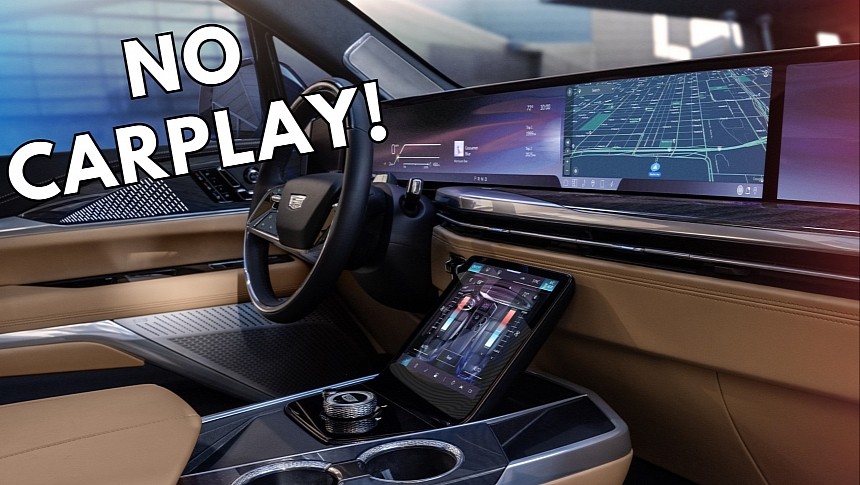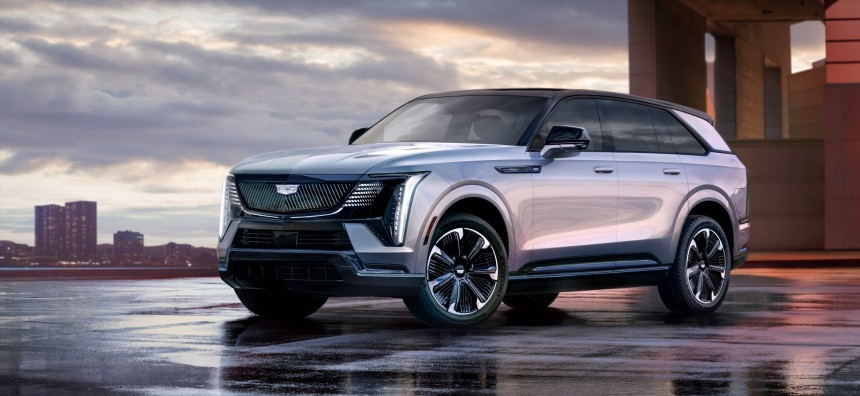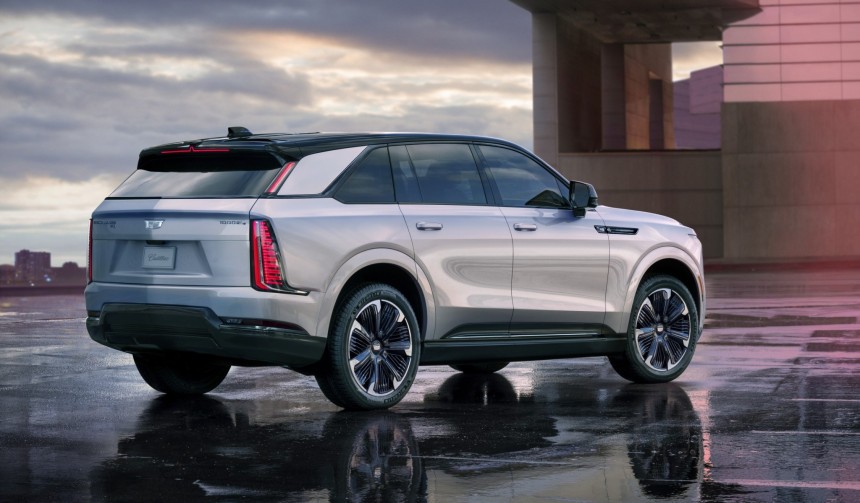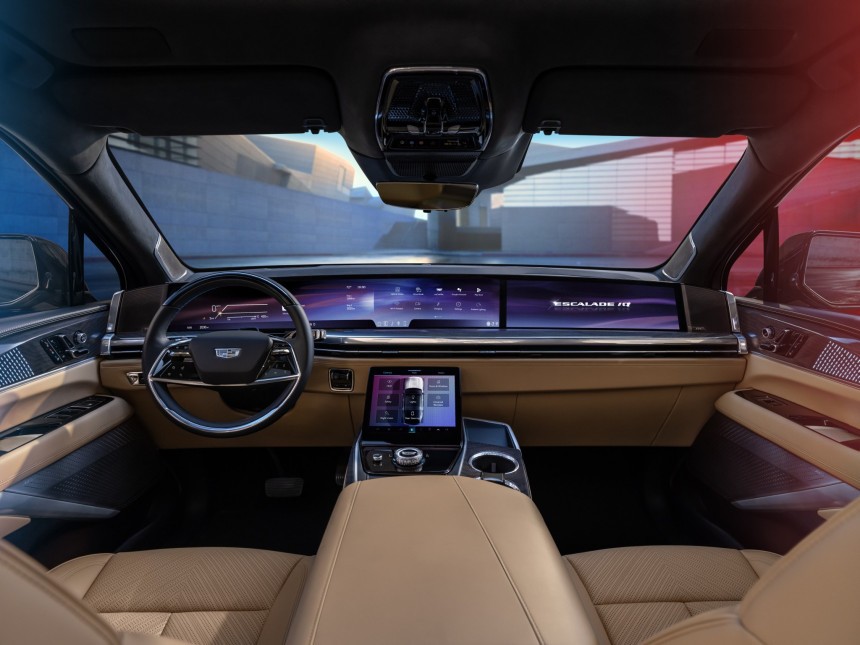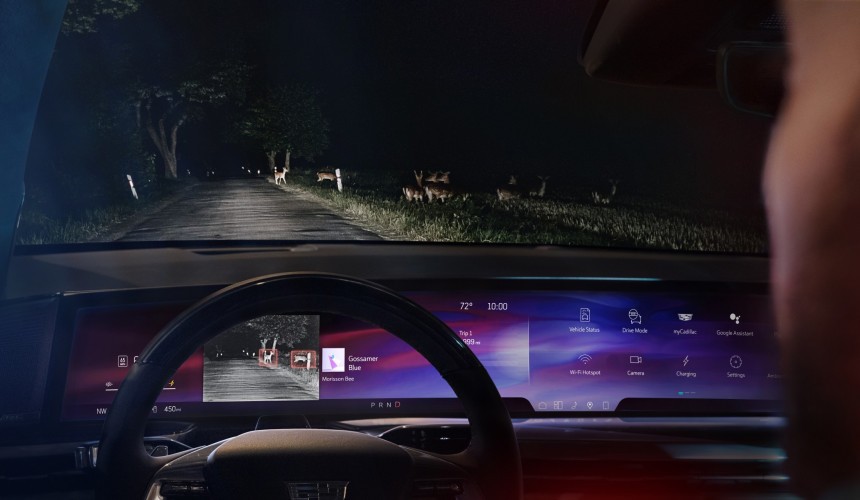General Motors sparked massive controversy earlier this year when it announced that its future EVs wouldn't support Android Auto and CarPlay.
The company is ready to go all-in on Android Automotive, Google's embedded operating system that offers deeper integration of services like Google Maps and Google Assistant. Unlike Android Auto and CarPlay, Android Automotive does not require a mobile phone to run. It's the operating system powering the infotainment capabilities, and apps run directly on the car's hardware (unlike in Android Auto's case, where apps run on the mobile phone, which in turn projects the UI to the infotainment screen).
GM's transition from Android Auto and CarPlay to Android Automotive begins with the 2024 Blazer EV and will continue with all zero-emission models in its future lineup. The company plans to switch to EVs completely by 2035, so in theory, it's all a matter of time until Android Auto and CarPlay waves goodbye to the entire GM vehicle lineup.
The recently announced Cadillac Escalade IQ is also part of GM's migration to a world without Android Auto and CarPlay. The super-expensive SUV will run Android Automotive and won't support mobile phone projection systems.
The Escalade IQ is living proof GM has no intention of giving in to haters. The company has been under heavy fire since it announced its decision to block Android Auto and CarPlay, and after promising a significantly upgraded experience behind the wheel, its latest unveiling is living proof the strategy is making progress at full speed.
In the last few months, I've seen countless people claiming they wouldn't buy a GM model without CarPlay. In the worst case, they'll switch to Ford – these people seem to believe that threatening GM with a switch to its biggest rival would convince the carmaker to undo its decision, but at the end of the day, there's no way they'll get a new car without Apple's system.
The criticism has been intense. But it'll pass. As in love, time heals all wounds. It's all a matter of time until people forget General Motors killed off Android Auto and CarPlay, and eventually, using Android Automotive will no longer be such a big deal.
First and foremost, not everybody hates GM's decision to give up on these systems. Buying a new car is a decision that comes down to many other factors, and some people are more interested in the engine, the fuel consumption, the quality of materials in the cabin, and so on. Don't get me wrong, I wouldn't buy a new car without CarPlay either (my daily driver has wireless CarPlay, and I literally can't imagine not being able to run Waze on the infotainment screen during my daily commute). Still, some drivers don't care that much about it.
Apple's statistics claim nearly 8 in 10 American buyers would say no to a vehicle without CarPlay. The numbers paint a scary picture for General Motors, but I'm not sure they're as accurate as Apple wants them to be. Kantar data reveals that Apple controls a market share of 43 percent in the United States, with Android running on 57 percent of the new devices sold in the three months ending June 2023. Close to 6 in 10 devices sold in the United States in April, May, and June run Google's operating system. Android Automotive is an extension to Android, and users can log in with a Google account to access their data, including in Google Maps.
Out of curiosity, I checked the comment section of the official Escalade IQ launch video, thinking I'd come across a flood of hate against the no-CarPlay policy. To my surprise, commenters are impressed with the new Escalade and discuss the SUV's premium capabilities rather than the lack of Android Auto and CarPlay. Sure enough, comments are moderated, and GM can remove posts criticizing its strategy, but most people seem to have a different focus anyway.
Then, people forget. And they do it faster than most of us can imagine.
Not long ago, a decision announced by the social platform reddit caused the most impressive digital revolution I've seen lately. Users threatened to leave the platform, moderators closed subreddits, and developers shut down their apps in protest of reddit's decision to charge for API access. The rebellion lasted for days, but reddit's leadership team didn't cave.
After a few difficult weeks, everything's back to normal. Indeed, some users jumped ship and stopped using the service, but most are still there. Netizens connect to their favorite subreddits (now unlocked), and reddit sticks with its controversial policy.
Reddit users, the same people who claimed they'd switch to competing platforms, are still there using reddit. Nobody talks about the protests anymore.
I expect the same thing to happen in GM's case too. Everybody talks about its decision to kill Android Auto and CarPlay because the American company is the first big company to do it. Almost certainly, it won't be the last.
It's very important to understand why General Motors embraced this policy. The company claims that the switch to Android Automotive is based on the OS integration into EVs. Android Auto and CarPlay can't read vehicle data, so the carmaker needed an operating system capable of accessing critical information like the battery level and the range. Google Maps can look for routes based on the existing charge and suggest stops to recharge the battery. Android Auto and CarPlay can't do all of these because they're just an extension of the mobile phone.
The other reason comes down to monetization. GM can turn the infotainment system into a money-making machine, and the first thing that comes to my mind is the concept of location-based ads. I believe the carmaker will eventually sell ads on the built-in navigation system. It can also enable a subscription for an ad-free experience. Eventually, GM can turn to other monetization options, but all are powered by an operating system that it can control. With Android Auto and CarPlay, GM gives in control of the infotainment system to Google and Apple.
The resistance to change makes perfect sense at the end of the day, but it's probably a temporary rebellion that wouldn’t last long. GM could eventually backpedal and bring CarPlay to its future models, but in the long term, I believe subscriptions would become the new norm. The infotainment system is integral to the driving experience, and carmakers see it as the perfect monetization machine, especially as software and services conquer the automotive world.
GM's transition from Android Auto and CarPlay to Android Automotive begins with the 2024 Blazer EV and will continue with all zero-emission models in its future lineup. The company plans to switch to EVs completely by 2035, so in theory, it's all a matter of time until Android Auto and CarPlay waves goodbye to the entire GM vehicle lineup.
The recently announced Cadillac Escalade IQ is also part of GM's migration to a world without Android Auto and CarPlay. The super-expensive SUV will run Android Automotive and won't support mobile phone projection systems.
The Escalade IQ is living proof GM has no intention of giving in to haters. The company has been under heavy fire since it announced its decision to block Android Auto and CarPlay, and after promising a significantly upgraded experience behind the wheel, its latest unveiling is living proof the strategy is making progress at full speed.
The criticism has been intense. But it'll pass. As in love, time heals all wounds. It's all a matter of time until people forget General Motors killed off Android Auto and CarPlay, and eventually, using Android Automotive will no longer be such a big deal.
First and foremost, not everybody hates GM's decision to give up on these systems. Buying a new car is a decision that comes down to many other factors, and some people are more interested in the engine, the fuel consumption, the quality of materials in the cabin, and so on. Don't get me wrong, I wouldn't buy a new car without CarPlay either (my daily driver has wireless CarPlay, and I literally can't imagine not being able to run Waze on the infotainment screen during my daily commute). Still, some drivers don't care that much about it.
Apple's statistics claim nearly 8 in 10 American buyers would say no to a vehicle without CarPlay. The numbers paint a scary picture for General Motors, but I'm not sure they're as accurate as Apple wants them to be. Kantar data reveals that Apple controls a market share of 43 percent in the United States, with Android running on 57 percent of the new devices sold in the three months ending June 2023. Close to 6 in 10 devices sold in the United States in April, May, and June run Google's operating system. Android Automotive is an extension to Android, and users can log in with a Google account to access their data, including in Google Maps.
Then, people forget. And they do it faster than most of us can imagine.
Not long ago, a decision announced by the social platform reddit caused the most impressive digital revolution I've seen lately. Users threatened to leave the platform, moderators closed subreddits, and developers shut down their apps in protest of reddit's decision to charge for API access. The rebellion lasted for days, but reddit's leadership team didn't cave.
After a few difficult weeks, everything's back to normal. Indeed, some users jumped ship and stopped using the service, but most are still there. Netizens connect to their favorite subreddits (now unlocked), and reddit sticks with its controversial policy.
I expect the same thing to happen in GM's case too. Everybody talks about its decision to kill Android Auto and CarPlay because the American company is the first big company to do it. Almost certainly, it won't be the last.
It's very important to understand why General Motors embraced this policy. The company claims that the switch to Android Automotive is based on the OS integration into EVs. Android Auto and CarPlay can't read vehicle data, so the carmaker needed an operating system capable of accessing critical information like the battery level and the range. Google Maps can look for routes based on the existing charge and suggest stops to recharge the battery. Android Auto and CarPlay can't do all of these because they're just an extension of the mobile phone.
The other reason comes down to monetization. GM can turn the infotainment system into a money-making machine, and the first thing that comes to my mind is the concept of location-based ads. I believe the carmaker will eventually sell ads on the built-in navigation system. It can also enable a subscription for an ad-free experience. Eventually, GM can turn to other monetization options, but all are powered by an operating system that it can control. With Android Auto and CarPlay, GM gives in control of the infotainment system to Google and Apple.
